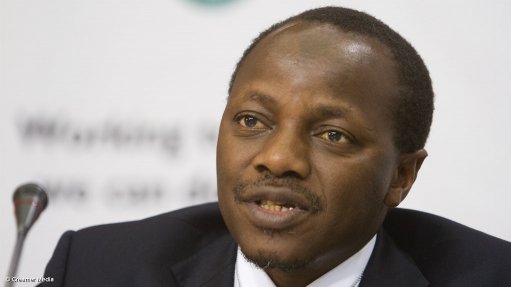
Collins Chabane
Photo by: Duane Daws
The telecommunications industry is likely to have more clarity on the functions and mandates of the two new communications departments within the next one to three months as a task team headed by the Department of Public Service and Administration maps out the respective roles.
Public Service and Administration Minister Collins Chabane said his department, along with National Treasury, the Presidency and other national departments, had established a task team to manage the establishment of all new national departments.
“We will do our utmost to ensure that the creation and resourcing of these departments is done in an accountable manner. Where applicable, we will consider identifying and transferring various units doing related work – and currently existing in other departments – to the newly established departments,” he said.
The Internet Service Providers’ Association (Ispa) on Friday explained that the outcome of the task team process would enable stakeholders in the telecommunications sector to gain a better understanding of the newly split Department of Communications (DoC).
However, Ispa treasurer Mike Silber raised concern that the telecommunications sector was not involved in the task team process.
In a surprise move shortly after the re-election of the African National Congress, President Jacob Zuma had de-established the Government Communication and Information Systems (GCIS) and established the Communications Ministry.
This new department combined the “old” GCIS with Brand South Africa, the Media Development and Diversity Agency, the Independent Communications Authority of South Africa (Icasa) and the South African Broadcasting Corporation.
Under Communications Minister, Faith Muthambi, the department was responsible for communication policies and strategies, information dissemination and publicity and the branding of South Africa abroad.
The Department Telecommunications and Postal Services (DTPS), in effect a replacement for the former DoC, had been tasked with ensuring that the country “derives more value” out of the booming information and communications technology industry and the postal services sector.
The DTPS would take over responsibility for Broadband Infraco, which formerly fell under the Department of Public Enterprises’ portfolio, as well as oversee the South African Post Office, the State Information Technology Agency and Sentech.
Ispa regulatory adviser Dominic Cull pointed out that, with Icasa seemingly under the wings of the Department of Communications, greater clarity would be required in terms of its mandate, as Icasa adhered to the Electronic Communications Act, No 36 of 2005, which was this week transferred to the DTPS.
Further, there was still no clarity on which of the two departments would officially be responsible for the roll-out of digital terrestrial television, as both Ministers joined in the debate on the long-awaited project’s future, Cull commented.
Earlier this week, Zuma, who officially designated the new departments within Cabinet two weeks ago, signed a proclamation transferring powers, legislation and functions.
The proclamation showed that the DTPS, headed by Minister Dr Siyabonga Cwele, would govern the Post and Telecommunication-Related Matters Act, No 44 of 1958; the former States Posts and Telecommunications Act, No 5 of 1996; the Postal Services Act, No 124 of 1998; the South African Post Bank Limited Act, No 9 of 2010; the South African Post Office SOC Act, No 22 of 2011; and the Telegraph Messages Protection Act, No 44 of 1963.
The telecommunications ministry would also be responsible for the Sentech Act, No 63 of 1996; the Former States Broadcasting Reorganisation Act, No 91 of 1996; the Department of Communications Rationalisation Act, No 10 of 1998; the Electronic Communications and Transactions Act, No 25 of 2002; and the State Information Technology Agency Act, No 88 of 1998.
The Communications Ministry would oversee the Independent Communications Authority of South Africa Act, No 13 of 2000; the Broadcasting Act, No 4 of 1999; the Films and Publication Act, No 65 of 1996, which was formerly under the auspices of the Department of Homes Affairs; and the Media Development and Diversity Agency Act, No 14 of 2002.